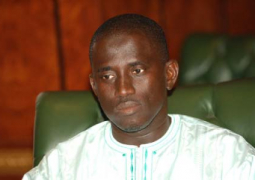The second application filed by Mambury Njie, former Foreign Affairs Minister, was yesterday heard at the Banjul High Court before Justice M. Abdoullah.
During yesterday’s hearing of the motion, Lawyer Lamin Camara submitted that the applicant, Mamburay Njie, was received at the State Central Prison of Mile 2 on14 December 2012.
The name of the applicant, the date he was received at the state central prison were all indicated in the register and the copy of that register was attached to the affidavit, counsel submitted.
Lawyer Camara further submitted that it was clearly stated in the affidavit that the defence counsel had visited the applicant in Mile 2 Central Prisons, adding that the applicant served the government of The Gambia in various positions.
He further stated that the applicant was arrested and detained, as contained in paragraphs 12 and 15, by the NIA, and subsequently by the serious crime unit of the police for investigation.
Counsel said that the investigation into the case, if there was any, was completed, and that the applicant would not interfere with the investigation, neither the witnesses.
“The applicant had no criminal record,” he said, adding that the applicant has people who are willing and able to stand as a surety for him if granted bail, and the applicant would not jump bail.
Counsel also told the court that the applicant is a diabetes patient, who was taking his medication, and exhibit MMC could attest to that, adding that the affidavit contained a cogent reason why he should be granted bail.
He stated that the affidavit in opposition did not deny that the applicant was detained at Mile 2 prison, nor the fact that the detention was unconstitutional.
He added that the affidavit in opposition stated that upon completion of the investigation more economic crime charges might be preferred against the applicant.
“There is no cogent reason to deny the applicant bail,” counsel submitted, noting that the deprivation of the applicant’s rights was not in accordance with such procedure, and not in accordance with the law.
The defence counsel further submitted that there was no court order to remand the applicant, who has been detained at the State Central Prisons for 30 days.
The respondent was yet to file any indictment at the high court, he said, stating that the continued detention of the applicant was unconstitutional and, therefore, he should be released forthwith.
He then urged the court to release Mambury Njie conditionally or unconditionally.
In response, the Director of Public Prosecutions, S.H. Barkun, informed the court that they filed a four-paragraph affidavit in opposition, and they relied on all, especially paragraph 3.
DPP noted that the applicant was claiming deprivation of right, and his continued detention was unconstitutional, and should be released conditionally or conditionally.
He submitted that the continued detention of the applicant was in line with the constitution.
Was a warrant signed by the court different from the order of the court, DPP asked? He went on to state that a warrant was the order of the court.
He added that one could not say the detention of the applicant was unconstitutional, stating that there was no dispute that a warrant was signed by the Banjul Magistrates’ Court, authorising the detention of the applicant.
The applicant was detained by the court and not the police, the DPP further submitted, stating that the law permits the magistrate to remand the accused if he or she did not have the jurisdiction to try him or her, and to transfer the case.
He added that the remanding of the applicant by court order was constitutional.
Hearing continues today.



